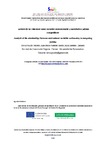Mostrar o rexistro simple do ítem
Análisis de las relaciones entre variables motivacionales y ansiedad en judocas competidores
| dc.contributor.author | Pulido Pedrero, Silvia | |
| dc.contributor.author | Fuentes García, Juan Pedro | |
| dc.contributor.author | Jiménez Castuera, Ruth | |
| dc.date.accessioned | 2019-04-29T11:46:48Z | |
| dc.date.available | 2019-04-29T11:46:48Z | |
| dc.date.issued | 2017 | |
| dc.identifier.citation | Sportis, 2017, 3 (3):436-453 ISSN: 2386-8333 | es_ES |
| dc.identifier.issn | 2386-8333 | |
| dc.identifier.uri | http://hdl.handle.net/2183/22782 | |
| dc.description.abstract | [Resumen] El judo de alto rendimiento se encuentra en continua evolución, explorándose nuevas formas de enseñanza y entrenamiento, que faciliten conducir al judoca hacia el éxito.El objetivo del presente trabajo fue analizar las relaciones que se establecen entre los diferentes tipos de motivación autodeterminada, necesidades psicológicas básicas, ansiedad cognitiva, ansiedad somática y autoconfianza en judocas competidores.Se analizó una muestra de 124 judocas competidores, 36 mujeres y 88 hombres pertenecientes a 16 clubes de toda España, cuyas categorías iban desde infantil hasta senior, con edades comprendidas entre los 12 y los 37 años.Para llevar a cabo dicho estudio, se pasaron los cuestionarios de Behavioral Regulation in Sport Questionnaire, para medir el nivel de motivación autodeterminada; el Psychological Need Satisfaction in Exercise Scale, para medir la satisfacción de las necesidades psicológicas básicas y el Revised Competitive State Anxiety Inventory, para medir el estado de ansiedad.Los resultados mostraron que la motivación intrínseca, correlacionó de forma positiva y significativa con la necesidad psicológica básica de competencia además de la autoconfianza en su dimensión intensidad. Por otro lado, la desmotivación, la regulación externa y la ansiedad somática en su dimensión intensidad, correlacionaron negativa y significativamente con la motivación intrínseca.Por consiguiente, los entrenadores tendrían que satisfacer las necesidades psicológicas básicas de los judocas, con el fin de provocar un aumento de las formas de motivación más autodeterminadas, pudiendo originar ello una mejora de la autoconfianza y una reducción de los niveles del estado de ansiedad. | es_ES |
| dc.description.abstract | [Abstract] High-performance judo is going through continuous evolution, exploring new forms of teaching and training, to facilitate conducting the judoka toward success.The objective of this study was to analyze the relationships been established between different types of self-determined motivation, basic psychological needs, cognitive anxiety, somatic anxiety and self-confidence in competing judokas. A sample of 124 competing judokas, 36 women and 88 men belonging to 16 clubs from all over Spain, ranging from children to seniors, ages ranging from 12 to 37, were analyzed.To carry out this study, the questionnaires for Behavioral Regulation in Sport Questionnaire were used, to measure the level of self-determined motivation; The Psychological Need Satisfaction in Exercise Scale was used, to measure the satisfaction of basic psychological needs and the Revised Competitive State Anxiety Inventory, to measure the anxiety state.The results showed that intrinsic motivation correlated in a positive and significant way with the basic psychological need for competence as well as the intensity amount for self-confidence. On the other hand, demotivation, external regulation and the intensity amount for somatic anxiety correlated negatively and significantly with intrinsic motivation.Therefore, trainers would have to satisfy the basic psychological needs of the judokas, in order to trigger an increase in more self-determined forms of motivation, which could lead to an improvement of self-confidence and a reduction of anxiety state levels | es_ES |
| dc.language.iso | spa | es_ES |
| dc.publisher | Universidade da Coruña | es_ES |
| dc.rights | Atribución-NoComercial-SinDerivadas 3.0 España | es_ES |
| dc.rights.uri | http://creativecommons.org/licenses/by-nc-nd/3.0/es/ | * |
| dc.subject | Motivación | es_ES |
| dc.subject | Necesidades psicológicas básicas | es_ES |
| dc.subject | Ansiedad estado | es_ES |
| dc.subject | Judo | es_ES |
| dc.subject | Motivation | es_ES |
| dc.subject | Basic psychological needs | es_ES |
| dc.subject | Anxiety state | es_ES |
| dc.title | Análisis de las relaciones entre variables motivacionales y ansiedad en judocas competidores | es_ES |
| dc.title.alternative | Analysis of the relationships between motivational variables and anxiety in competing judokas | es_ES |
| dc.type | info:eu-repo/semantics/article | es_ES |
| dc.rights.access | info:eu-repo/semantics/openAccess | es_ES |
| UDC.journalTitle | Sportis | es_ES |
| UDC.volume | 3 | es_ES |
| UDC.issue | 3 | es_ES |
| UDC.startPage | 436 | es_ES |
| UDC.endPage | 453 | es_ES |
| dc.identifier.doi | https://doi.org/10.17979/sportis.2017.3.3.1896 |






